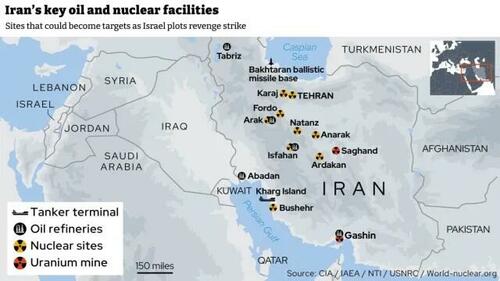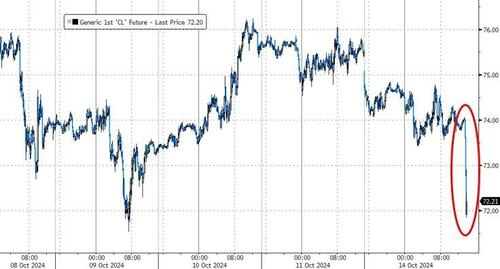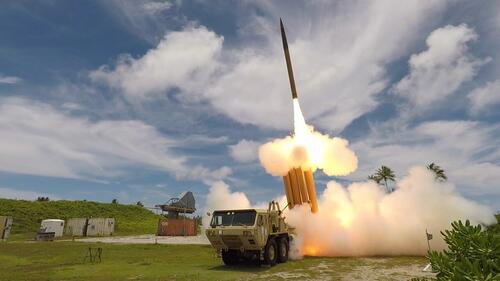
A full two weeks have passed since Iran's October 1st ballistic missile attack on Israel, which involved some 200 projectiles, many of which caused destruction on the ground (though Israel has been tight-lipped on the extent of it).
The big question has remained: when will Israel retaliate and what form will it take? The Biden administration has over the last many days reportedly been urging for Israel to avoid hitting nuclear sites as well as energy sites. But there have been conflicting reports.
For example on Monday, Harper's Magazine editor Andrew Cockburn wrote, "Word in Washington is that Biden has approved Israeli strike on Iran's Natanz nuclear site."
However, within hours after this speculative statement on X, The Washington Post reported that Israel is walking back from the prospect of bombing oil as well as nuclear facilities.
"Israeli Prime Minister Benjamin Netanyahu has told the Biden administration he is willing to strike military rather than oil or nuclear facilities in Iran, according to two officials familiar with the matter, suggesting a more limited counterstrike aimed at preventing a full-scale war," the Monday afternoon report said.
President Biden in a phone call with PM Netanyahu last Wednesday reportedly conveyed serious concern that any counterstrikes could lead to all-out war if not kept 'limited'.
Monday's afternoon WaPo headline was enough to send oil prices falling, also after morning reports of China's weak demand...
At the time of last week's phone call, Netanyahu had reportedly expressed that he favors attacks on the Islamic Republic's military infrastructure.
The Washington Post now appears to be chalking this up as a win for Biden diplomacy:
Netanyahu was in a “more moderated place” in that discussion than he had previously been, said the U.S. official, describing the call between the two leaders.
The apparent softening of the prime minister’s stance factored into Biden’s decision to send a powerful missile defense system to Israel, both officials said.
So the quid pro quo becomes clear... this is in reference to weekend reports saying the US is sending the THAAD anti-air missile defense system to Israel, for protection against Iran, which will include US troop operators.
However, at a moment that Israel is already engaged militarily on several fronts, especially in Lebanon with Iran-backed Hezbollah, absolutely nothing is certain.
There remain plenty of hawks in Bibi's security cabinet who are urging Israel to go big in its response. It is also the case that Netanyahu has been talking about taking out Iran's nuclear program for many years at this point.
A full two weeks have passed since Iran’s October 1st ballistic missile attack on Israel, which involved some 200 projectiles, many of which caused destruction on the ground (though Israel has been tight-lipped on the extent of it).
The big question has remained: when will Israel retaliate and what form will it take? The Biden administration has over the last many days reportedly been urging for Israel to avoid hitting nuclear sites as well as energy sites. But there have been conflicting reports.
For example on Monday, Harper’s Magazine editor Andrew Cockburn wrote, “Word in Washington is that Biden has approved Israeli strike on Iran’s Natanz nuclear site.”
However, within hours after this speculative statement on X, The Washington Post reported that Israel is walking back from the prospect of bombing oil as well as nuclear facilities.
“Israeli Prime Minister Benjamin Netanyahu has told the Biden administration he is willing to strike military rather than oil or nuclear facilities in Iran, according to two officials familiar with the matter, suggesting a more limited counterstrike aimed at preventing a full-scale war,” the Monday afternoon report said.
President Biden in a phone call with PM Netanyahu last Wednesday reportedly conveyed serious concern that any counterstrikes could lead to all-out war if not kept ‘limited’.
Monday’s afternoon WaPo headline was enough to send oil prices falling, also after morning reports of China’s weak demand…
At the time of last week’s phone call, Netanyahu had reportedly expressed that he favors attacks on the Islamic Republic’s military infrastructure.
The Washington Post now appears to be chalking this up as a win for Biden diplomacy:
Netanyahu was in a “more moderated place” in that discussion than he had previously been, said the U.S. official, describing the call between the two leaders.
The apparent softening of the prime minister’s stance factored into Biden’s decision to send a powerful missile defense system to Israel, both officials said.
So the quid pro quo becomes clear… this is in reference to weekend reports saying the US is sending the THAAD anti-air missile defense system to Israel, for protection against Iran, which will include US troop operators.
However, at a moment that Israel is already engaged militarily on several fronts, especially in Lebanon with Iran-backed Hezbollah, absolutely nothing is certain.
There remain plenty of hawks in Bibi’s security cabinet who are urging Israel to go big in its response. It is also the case that Netanyahu has been talking about taking out Iran’s nuclear program for many years at this point.
Loading…






